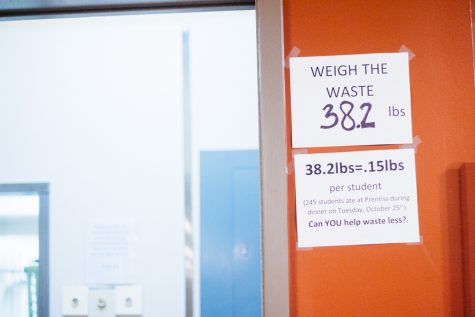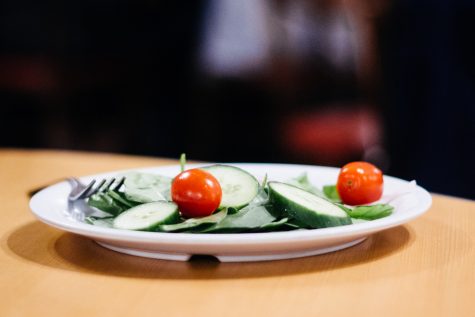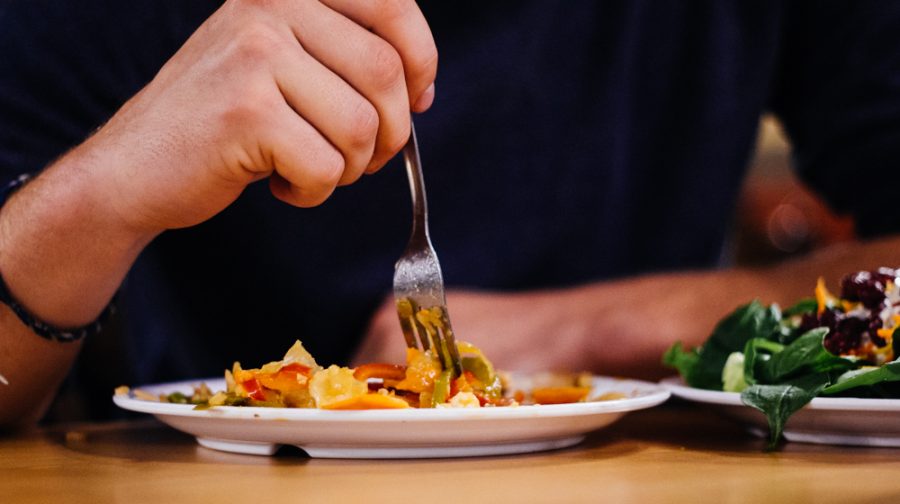Weighing In On Whitman’s Food Waste
November 3, 2016
This past week, student representatives from the Campus Climate Coalition (CCC) and the ASWC Sustainability Committee, as well as a sustainability fellow from Bon Appétit organized “Weigh the Waste” events at Prentiss and Jewett dining halls.
All the food that students threw out in Prentiss and Jewett was weighed and the total waste was reported back to the students at the end of the meal. “Weigh the Waste” is an activity designed to catch the attention of students who otherwise might not realize how much food they throw away. The numbers from the event are startling–245 students ate at Prentiss for dinner on Tuesday night, with a total of 38.2 lbs of waste from their plates. This comes out to around .15 lbs of waste per student at Prentiss. On Wednesday, 167 students ate at Jewett and there was around 20 lbs of waste from plates. This is around .12 lbs per person. Any leftover food from the kitchen that was thrown out, collectively referred to as the “backhouse waste,” was also weighed. The backhouse waste at Prentiss for one day last week totaled 90 lbs. All the food that gets thrown out in the dining halls stays in the trash, eventually making its way to the landfill in Walla Walla.

Maggie Kraft, a fellow for Bon Appétit, was present at the Weigh the Waste event. Kraft’s job as a fellow involves traveling around to different college campuses that use Bon Appétit meal plans. She works with student groups on campus to put forth events and materials that raise student awareness of sustainability and other food related issues such as animal welfare, farm worker’s rights and climate change.
“[Weigh the Waste events] are to raise awareness, just so students are more aware as they take food for themselves, [of] what’s left at the end of the night. It’s hard to see it when it all goes into a trash can, it’s just not visible,” Kraft said. “For the most part, people don’t have much waste, but the point is that it does all add up. It’s just good to be cognizant of what you are taking.”
Food waste constitutes between 30 and 40 percent of all food in the United States, and the food that doesn’t get composted goes to a landfill. Once the food is in the landfill, it decomposes and produces methane gas which is a greenhouse gas incredibly detrimental to the environment. One way to avoid the methane gas is to compost leftover food.
Lydia Petroske, member of the ASWC Sustainability Committee and leader of Campus Climate Coalition mentioned compost facilities as a solution farther off in the future, but not something to rely on currently.
“The landfill’s only five miles away, and there hasn’t been a big push to have industrial composting in Walla Walla,” Petroske said. “Whitman isn’t necessarily able or desiring currently to have a large compost facility on campus.”

While Whitman has had various small composters in the past, all have been based on student initiative.
ASWC Sustainability and Campus Climate Coalition are looking for other ways to use the leftover food, and one way they’ve found is a establishing a Food Recovery Network at Whitman. At many college campuses across the U.S. Bon Appétit has partnered with this non profit to help distribute the leftover meals in their dining halls. Campuses with a Food Recovery Network have volunteers collect all the uneaten meals from the kitchen, for example full pizzas that were not eaten by the students. The food is transported in bins to local organizations like homeless shelters or senior centers.
Margo Heffron, part of the team on Campus Climate Coalition helping to set up the Food Recovery Network, talked about why she wants a chapter at Whitman.
“We would donate the food so it goes to a good cause and gets eaten, and so it’s not going to a landfill,” Heffron said. “Hopefully we can start doing this next semester.”
There are many ways students can become involved in making sure Whitman’s food is disposed of in a sustainable way. Members of ASWC Sustainability and CCC suggested having students walk to the organic garden to compost their food there, and remembering to be mindful when you are being served food to only take as much as you can really eat.
For those interested in learning more about the topic of food waste and how companies and restaurants manage leftover food sustainably, the documentary Food Savers will be screened at 7:00 p.m. in the Anderson Lounge this Thursday, Oct. 3.






